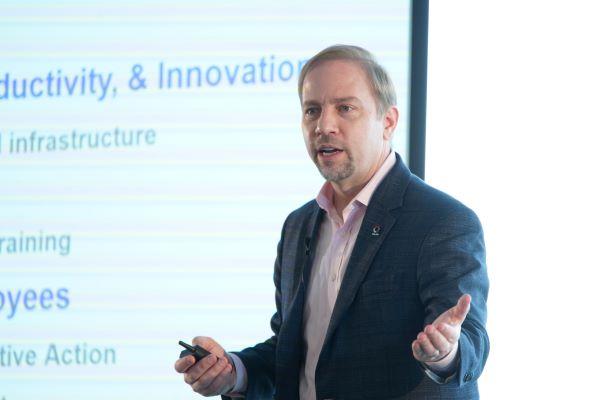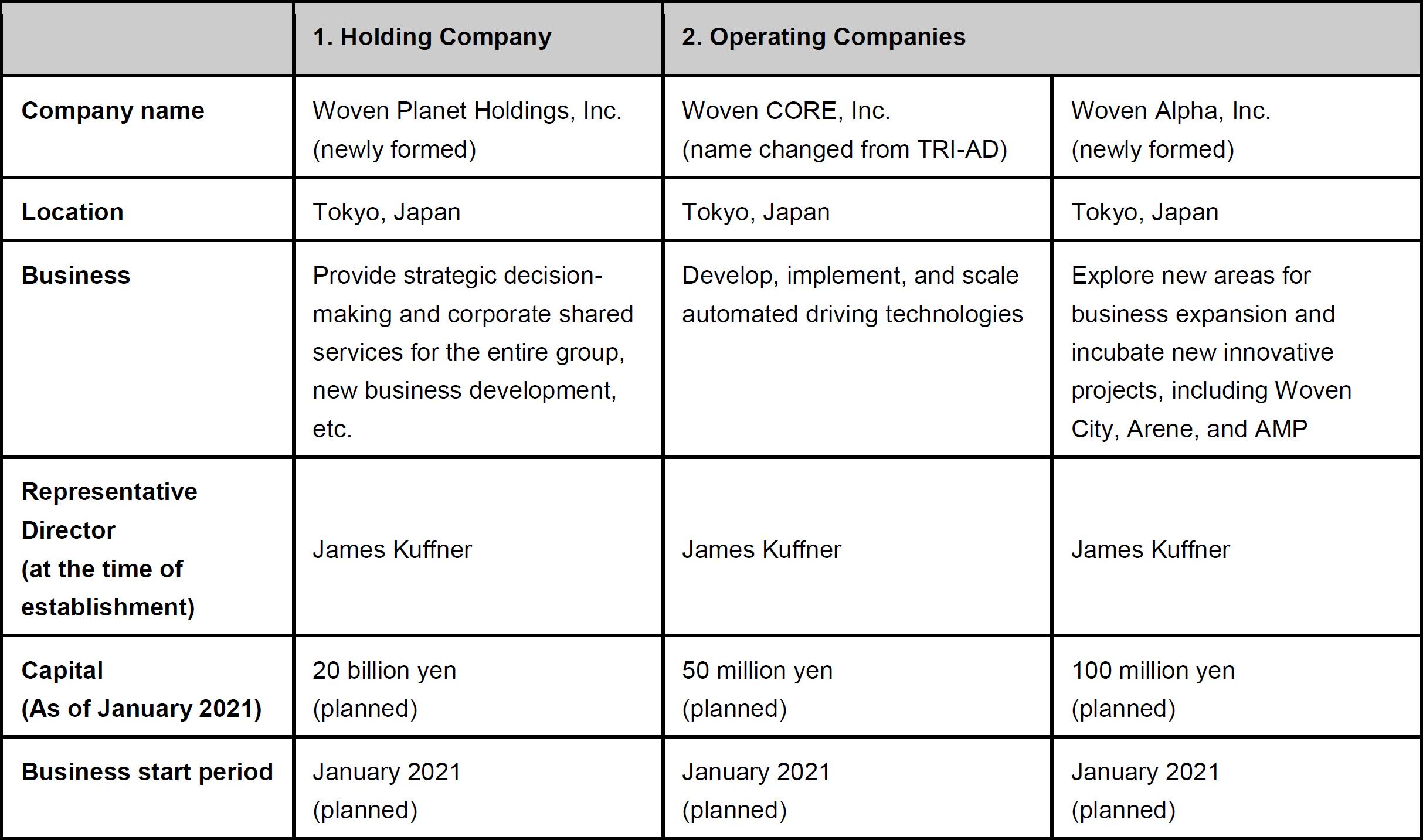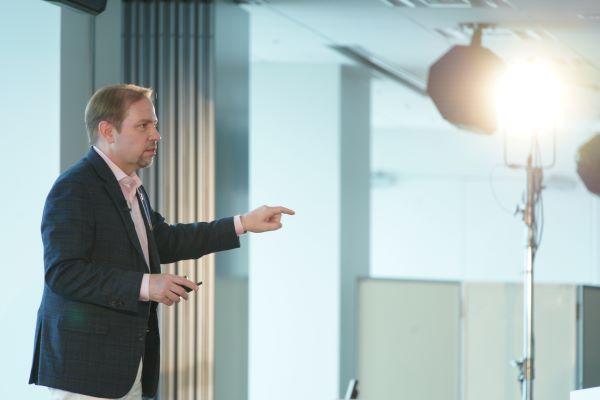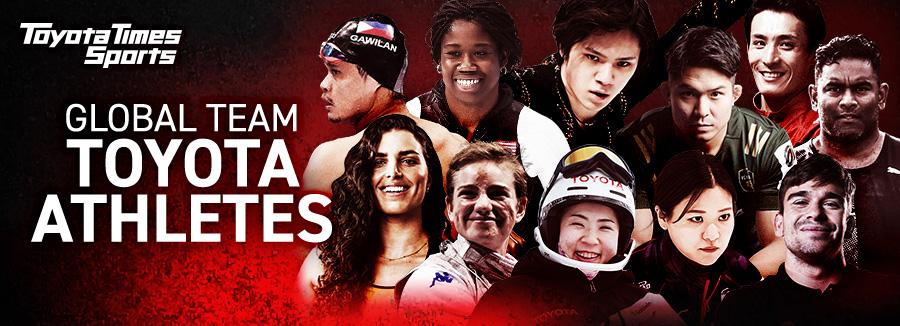
On July 28, TRI-AD announced an expansion and reorganization with one holding company and two operating companies, all including "Woven" as part of their names - but what significance does that have?

1. TRI-AD to undergo expansion
At Toyota, there are many affiliate companies, especially those that include the Toyota moniker as part of their name, including Toyota Research Institute – Advanced Development. Whether it is because of the long name or some other reason, there are few people within Toyota who refer to the company using its official name. Instead, almost everyone calls it “TRI-AD” (pronounced “tee-are-eye-eh-d”).
TRI-AD was established in March 2018 with a role to build a robust pipeline between research and production in order to accelerate the development and deployment of automated vehicle technology.

On July 28, TRI-AD announced that it would undergo an expansion. The change was announced as part of the company’s efforts to expand and improve its operations by forming a holding company and two operating companies, and the companies will have new names.
The holding company will be named “Woven Planet Holdings,” and the two operating companies under it will be Woven CORE and Woven Alpha. While the new names are shorter and easier to read, that is not really the point of this change.

To announce these changes, TRI-AD held an all-staff meeting to inform them of the change. Toyota Motor Corp. President Akio Toyoda, though not having any specific title or responsibility at TRI-AD, also joined the meeting, actively participating as he shared his passion about the company in his own words.
In his remarks, Akio shared his thoughts on what the founding family has woven into Toyota and the company’s commitment to passing along these values to the future generations, something that most likely struck a chord for those attending the meeting. However, it was not just all talk from Toyota’s global leader – he demonstrated his commitment with his action as well.
In its coverage of this announcement, Toyota Times will publish two articles. The first is about the changes in the organization, and the significance of the name “Woven.” In the second article, the focus will be on Akio’s comments made at the meeting and how they represent his commitment to ensuring Toyota’s continued success moving into the future.
This article will be discussing the changes in the organization and the significance of the use of the word “Woven” in the new companies’ names.
2. Woven CORE: A company with a mission to make “products of the future”
To explain what exactly TRI-AD does in more detail, Dr. James Kuffner, CEO of TRI-AD, shared the following:
Dr. James Kuffner, CEO of TRI-AD
Established in March 2018, one of the aims of TRI-AD has been to strengthen software capability at Toyota. Another is to play a role as a bridge between advanced R&D and the mass production of vehicles.

There are many people researching and developing technologies that are not yet to the point of being commercialized. TRI-AD’s role is to take the R&D project “seeds” that are sprouting and nurture them to become actual products for customers. Woven CORE, one of the two operating companies that will come from the expansion and reorganization, will continue to play this role with a focus on developing and implementing automated driving and advanced safety technology for introduction to the market and further acceptance of the technology.

Automated driving is an ever-evolving technology; developing a robust system is challenging because there are countless driving situations.
For example, when riding as a passenger in a conventional car, you may have experienced a situation where the driver pushes the brakes a little slower than you would have had you been driving yourself.
If it’s a road you are used to driving on, you are also probably accustomed to changing the way you drive depending on weather conditions, such as when it is rainy or windy, although you may not be fully aware of it when you are the one driving.

In order to offer automated driving technology where everyone can have a feeling of safety, the automated system would need to be able to reproduce an infinite number of conditions that are subject to change when driving, such as changes that occur depending on the driver or external factors like the weather. This is the part that Woven CORE will be working on. Therefore, once automated driving technology is commercialized and implemented, the engineers at Woven CORE will continue working on evolving the automated driving and advanced safety technology to help increase peace of mind and the feeling of safety for drivers and passengers, based on data that the vehicles will provide.
3. Woven Alpha: Working to change the future way of life

So, according to the news release, Woven Alpha will lead the efforts to realize Woven City, Toyota’s prototype city announced in January this year, but the news release also mentions “Arene.” What is the “Arene” project? Dr. Kuffner explains it this way:
Dr. James Kuffner, CEO
When we look at the example of what happened in the mobile phone industry, in older cell phones, software was only developed for one specific device. But as devices (hardware) started to have various functionalities, powerful software development platforms, such as iOS and Android, enabled various third parties to take part in the development of applications more easily, which enabled many functions on a mobile phone such as listening to music and taking pictures. The same innovation is happening now in the world of mobility, including connected cars.
Our dream is to provide a world class mobility software platform developed by the Toyota Group. I believe this project we call Arene together with connected mobility services will be the platform that will improve Toyota’s competitive advantage.

Arene is a concept to create a programmable operating system for cars/mobility. However, when discussing the topic further with the subject matter experts, it was clear that simply describing it as an operating system is insufficient.
Subject matter expert of Arene
To be precise, Arene is not simply an operating system (OS). Rather, Arene is the way we express the broader ecosystem for mobility software development. While it might be easier to describe or think of it as an OS, it’s not only an OS, but it also includes a set of developer tools.
Honestly, it’s a rather abstract concept that makes it difficult to understand, but the following is an attempt to simplify it for the reader.
When one thinks of an ecosystem, probably the first that comes to mind is a biological community of interacting organisms, such as plants and animals, their physical environment, and how they rely on each other for their existence.
Within a single car, there are a variety of functions or parts that co-exist together. These parts and functions are key players in the ecosystem of a vehicle. Some examples are an engine, an accelerator, brakes, and steering; many of these have existed since they were developed in the 19th century when the first automobile was invented by Daimler.
Now, there are newcomers just joining the ecosystem. Among the newest are functions related to automated driving.
Specifically speaking, those parts include cameras and sensors that function as eyes for the car to help support drivers, computers that make vehicle driving decisions based on the information provided by such devices, and computers that relay the driving control information needed to execute the decisions by operating the accelerator, brakes, and steering. With these automated driving functions sharing the work with the human driver’s eyes, brain, hands, and feet, all types of functions are or will be integrated into vehicles moving forward.
If the ecosystem does not facilitate the introduction of newcomers and compatibility with existing or traditional products or companies, it may be more difficult for vehicles to function properly in the future. If the new sensors are capable of collecting data, but that data is not usable by the brakes, for example, of what value is the data?
However, as one might imagine, today’s cars are basically designed and engineered in a traditional way. That’s where TRI-AD comes in and says:
“We will provide a flexible software environment where traditional players and newcomers can collaborate together to create the best performance. We call that environment: Arene!”
Arene is still under development. This is because the needs of both the traditional players and newcomers must be considered concurrently, and doing that takes time and money.
It is this area that is so critical to the future of mobilitythat Woven Alpha and the Arene team will be working on.
On the other hand, the majority of the traditional portion for automobiles is handled by Toyota Motor Corporation. Therefore, the reality is that in order for the concept of Arene to work, there needs to be strong collaboration between the newcomer Woven Alpha and the traditional Toyota Motor Corporation.
4. Expectations of “Woven Planet”
The new three companies are taking upon themselves the word “Woven” and the holding company will also include the word “Planet” in its name. This has its own significance. Akio took some time to offer an explanation of the meaning of and reason why this word “Planet” was used.
Akio
So why did we use the word “Planet” in the name of the company?
It is because everyone who lives on this planet are citizens of Earth. “Planet” was used with the hope and expectation that the company will provide a platform that will contribute to the combined future of all the citizens of Earth. We see it as a “shared opportunity for all.”
It will be a great company if everyone passionately does their best to use each other’s strengths for the benefit of others, rather than having a “versus” mentality (such as trying to outperform each other to win a “battle”). Having that mentality will become a strength of this company.
Akio has frequently used the term “Home Planet” in the past. From what he has said in the past, this term refers to the love and care we should have for others, transcending borders, languages and cultures, as we pursue what is best for our common home of Earth, with the same pride, passion, and love we feel for hometowns and home countries.
There are still many negative aspects of vehicles such as air pollution and traffic accidents.
An example of a challenge that we collectively face is air quality. Preserving and improving the quality of the air on Earth, our common asset, is important as there are no borders for air. Automakers should not compete to achieve zero traffic accidents and sustainable mobility that is more friendly for the environment. Akio often reiterates this point as he says: “We all have to make efforts with an idea of ‘doing things for others or for the Earth’”.
TRI-AD’s current mission includes paving the way for a mobility society that focuses on helping people and the whole planet. The organizational change TRI-AD will undergo is an opportunity to speed up such efforts, and the new name “Woven Planet” embraces the strong passion expressed by Akio Toyoda.
Lastly, there is a video for you to watch. In this video, Akio is sharing his remarks to the TRI-AD team members that gathered for the internal meeting on July 28 to explain the organization change. In his remarks, Akio revealed a surprising fact:
"I am personally investing a significant amount of my own money in this company."
In part two, we would like to focus on what this “significant amount of personal investment” means.

